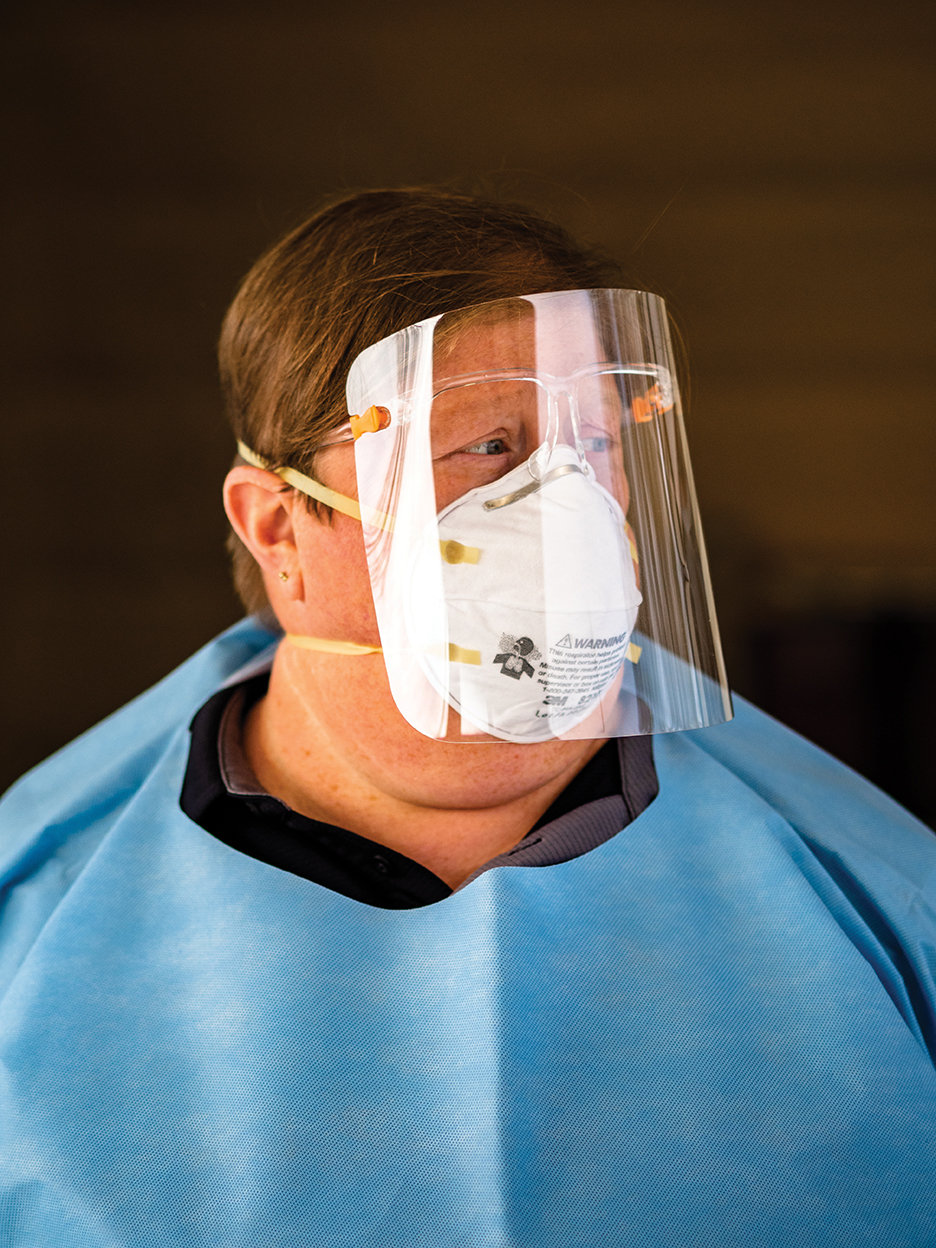Cynthia Lee and the Campbell Health Center team have tested thousands of students and staff to keep the campus running safe through the pandemic
Cynthia Lee is exactly where she needs to be — sitting in a brown and tan one-room aluminum “shed,” surrounded by personal protective equipment, filing cabinets and testing kits. She’s sitting at her desk, off her feet for the first time in hours after having just conducted COVID-19 tests on an entire basketball team at the convocation center.
She points to two stickers on her computer, both reveal Bible verses close to Lee’s heart.
Isaiah 6:8. Then I heard the voice of the Lord saying, “Whom shall I send?” And I said, “Here am I, Lord. Send me!”
Esther 4:14. Perhaps this is the moment for which you have been created.

“I know I’m supposed to be at Campbell,” says Lee, a nurse practitioner who came to Buies Creek in May 2019, less than a year before a pandemic turned the world upside down. “And I’m supposed to be doing exactly what I’m doing.”
What she’s doing is crucial to Campbell’s efforts to conduct in-person classes and on-the-field athletics over the past eight months. From the moment the University learned of its first positive COVID-19 case on March 12, 2020, through the administering of its first vaccines to Harnett County residents nearly a year later, Lee and the team at the Campbell Health Center have conducted thousands of tests on students, faculty and staff and nearby residents.
That means thousands of nose swabs. Thousands of anxious minutes between tests and results. And while the positive rates on campus have been relatively low, Lee has delivered more than her fair share of bad news to those who are found to have the virus.
“For those who come showing symptoms, they’re already here with an index of suspicion that they already have it,” Lee says. “But many arrive asymptomatic or test because they have to. It’s a blow to the gut to learn you have it. That’s when we guide them on their next steps — it affects people differently. Some never show symptoms, while for others, it may take weeks to get back to normal.”
Campbell benefited greatly from its army of health science professionals on campus when the pandemic hit. Professors and staff from the medical, pharmacy, public health, nursing and research schools and departments stepped in on Day 1 to provide leadership and guidance when little was known about the virus and how to proceed. Campbell, like schools around the world, made the decision to halt all on-campus learning on March 16, 2020, just four days after the first positive test. By then, the University had learned of three cases total.
Dr. Nicholas Pennings, chair of family medicine for the Jerry M. Wallace School of Osteopathic Medicine, led the University’s efforts to communicate with the community and provide testing for students that week. Pennings, Lee, registered nurses Amy Allen and Susan Autry, Health Center pharmacy manager Katie Trotta, office manager Tammy Matthews and a bevy of professors and health science graduate students have manned the Health Center and set up a drive-through testing site before those became commonplace in North Carolina. In November, the team set up a site in the Oscar N. Harris Student Union and tested nearly 1,000 students before they left for winter break. In January, they tested every student upon their return.
The result? Since August of last year, Campbell has endured just one pause in on-campus learning — in late September — and the athletics program has returned nearly full schedules this spring. With mass vaccinations and the country’s steady climb toward “herd immunity,” Campbell looks to come out on the other side of the pandemic more fortunate than other colleges and universities, many of which had to close their campuses nearly an entire year.
Lee says she’s been working her entire career toward this moment. She was a junior at the University of North Carolina when she first took an interest in a career in the medical field. She was asked to help take care of a sick uncle the summer after her graduation, and it was that experience that guided her toward the nursing field. She earned her master’s degree in 2001 and returned to UNC 12 years later to work toward her doctorate. Before Campbell, she worked 19 years as a family nurse practitioner at Dunn-Erwin Medical Center.
Over the past 12 months, Lee has been the definition of a frontline worker. She’s come into close contact with everybody she’s tested, but she’s trusted her PPE — N95 masks, shields, gloves, protective gowns and more — and says she’s never felt at-risk. She was among the first in Harnett County to receive the COVID-19 vaccine; her first shot on Dec. 29 and the second dose on Jan. 19.
The “shed” may be small and quiet, but Lee is comfortable there. She’s less worried about her surroundings and more focused on her job and ensuring the safety and well-being of the Campbell community.
“I just know that I’m supposed to be looking after people in my career,” she says. “That’s my calling in life.”



